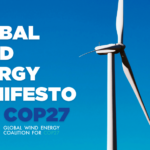UK faces legal threat over ‘half-baked’ energy security plans
Energy Disrupter

UK energy secretary Grant Shapps said today (30 March) that the government plans to embrace nuclear power, carbon capture technology and hydrogen production alongside the continued deployment of offshore wind and solar energy as part of its “powering up Britain” proposals.
The proposals include the government opening the UK’s fifth contracts for difference (CfD) auction for renewables – backed by £205 million (€233 million) of government funding – reiterating its existing 50GW offshore wind goal for 2050, highlighting an already announced €160 million pot for floating offshore wind pilots, and briefly mentioning an ongoing consultation on easing restrictions on onshore wind.
Legal threat
Responding, climate campaigners threatened legal action against the government.
Friends of the Earth has instructed its lawyers to study the plans in detail and pursue legal action if they failed to match the UK’s legally binding commitments to reach net zero emissions.
“Ministers should be scaling up and accelerating the race to net zero, but these plans look half-baked, half-hearted and dangerously lacking ambition,” Mike Childs, the head of Friends of the Earth’s climate policy department, said.
In July 2022, the UK High Court ruled the government’s existing net-zero strategy was unlawful for not showing how the UK would meet its climate targets.
Policy failure
Meanwhile, energy industry experts argued that the latest proposals muddled previous policies and failed to present a coherent strategy for decarbonising.
Industry body RenewableUK claimed the proposals “do not go far enough” to attract investment in renewables.
Its executive director of policy, Ana Musat, added: “The government has highlighted some important steps forward in existing policies and schemes, but we need much more than a ‘business as usual’ approach to kickstart investment on the level we need to boost energy security, cut consumer bills and reach net zero. Without that, we won’t land the UK-wide economic benefits of building up new clean energy supply chains, as they will go elsewhere where the investment environment is more conducive and attractive.”
And David Elmes, head of the Global Energy Research Network at Warwick Business School, said: “Today’s ‘powering up Britain’ plan is a bit of a recycled combination of two previous strategies – the energy security strategy and the net zero growth strategy – and struggles to outline a coherent vision.
“The energy security strategy says it is short-term with more wind and solar energy to be generated here in the UK. But it includes support for solutions that will take time and be much more expensive like hydrogen, power with carbon capture and new nuclear.”
Onshore wind ‘scandal’
Adam Bell, head of policy at Stonehaven and former head of energy strategy at the UK Department of Business, Energy and Industrial Strategy (BEIS), said: “The government’s failure to lift the ban on onshore wind in England is nothing short of a scandal. Restricting our ability to deploy the cheapest form of power generation means higher bills for us all.”
Wind energy giants have repeatedly called on the UK government for support amid falling investments in new wind energy projects across Europe last year.
Danish energy giant Ørsted said earlier this month that without more state help, “extraordinary” pressures of rising interest rates and supply chain prices put multi-billion pound UK offshore wind farms at risk.
The “powering up Britain” proposals are part of the UK’s government’s response to pressure from major economies that have produced sweeping new legislation embracing the transition away from fossil fuels, such as the US with the Inflation Reduction Act (IRA) and the EU’s multi-faceted European green deal.
Firm redirects investment to US
UK battery storage developer, Kona, said it was planning to divert future investment from the UK to the US.
Explaining the decision, Andy Willis, the founder of the company, said: “This is multifactorial, including on the basis of rapid American grid connections and a more favourable investment climate, alongside a willingness from authorities to find reasons to support projects, rather than to delay and obstruct. They are seriously backing their net zero ambitions with the US Inflation Reduction Act. Without a British equivalent, the UK will fall behind.”
Climate think tank E3G claimed the proposals did not contain sufficient new policies and will not help to attract new investment in the UK’s renewable energy sector.
“The vast majority of the policies set out today were announced last year, and there is little new money on the table. The package as a whole is underwhelming. Although it marks progress, it is unlikely to convince international investors that the UK can retain leadership as the green industrial revolution unfolds,” the group stated.















